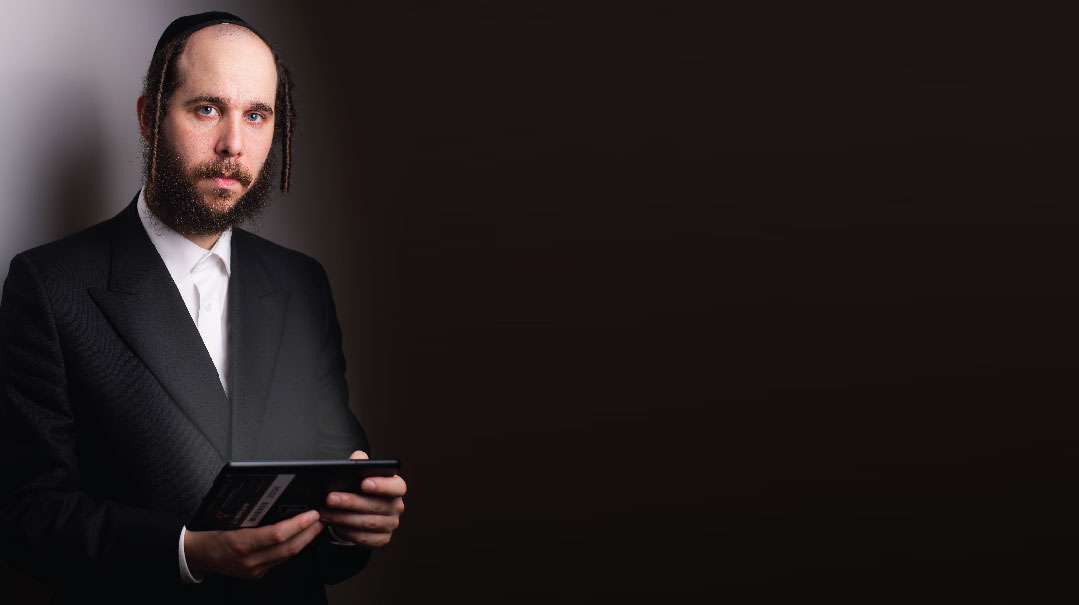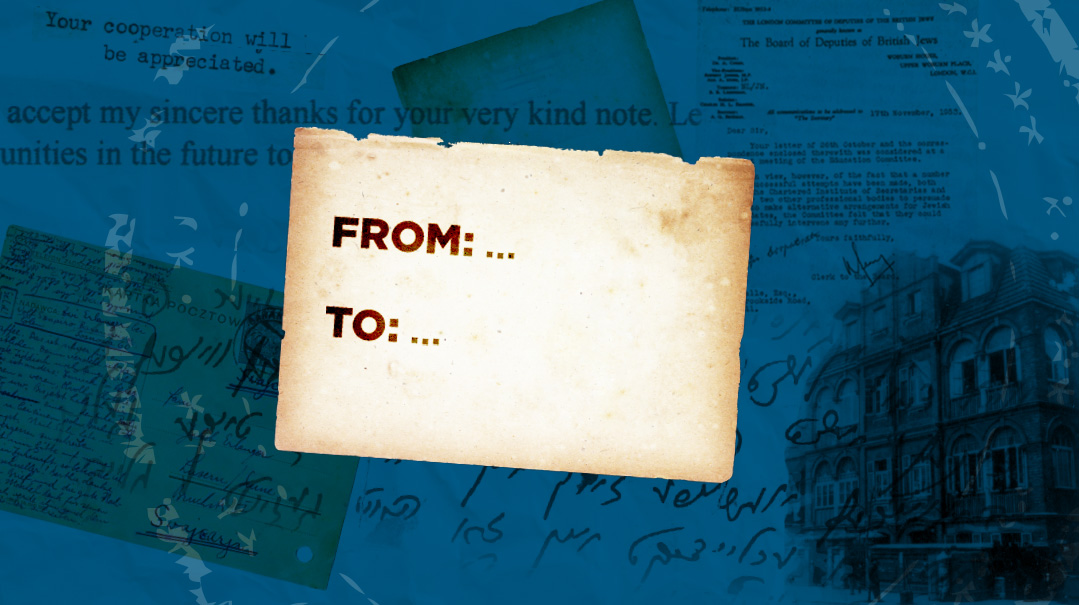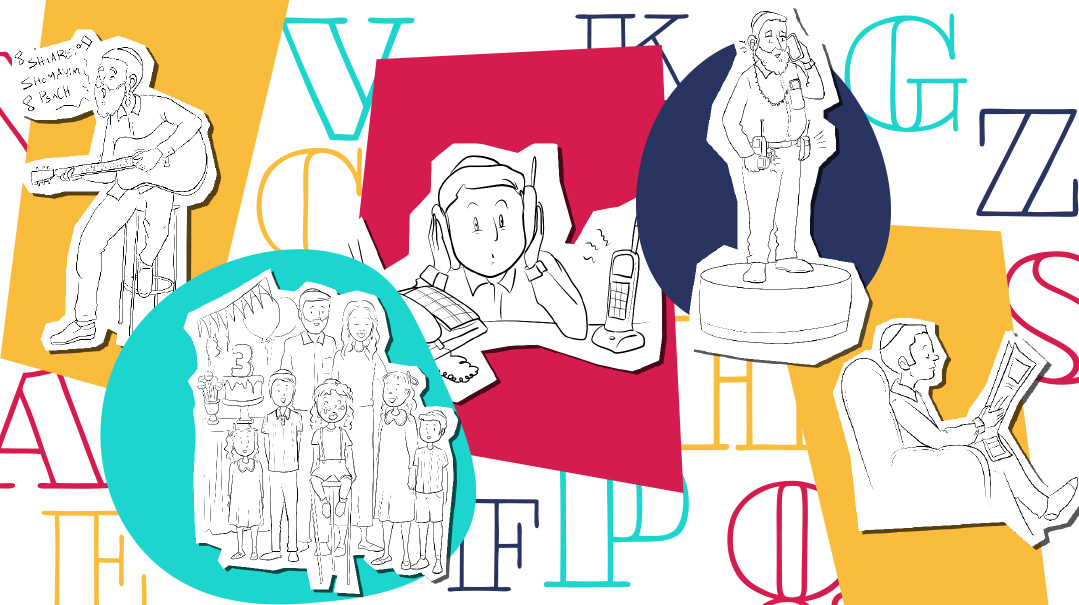Tablet to Tablet
| August 5, 2020For patients alone in Covid-19 wards, the tech connection is the next best thing to being face to face

Photos: Naftoli Goldgrab
For patients alone in Covid-19 wards, the tech connection is the next best thing to being face to face
Many of us can remember exactly what were and what we were doing when coronavirus became our new reality and life as we knew it was blown out of the water. For Williamsburg resident Yoely Friedman, he knew the pandemic was upon us when he saw sales quadrupling in his online electronics business as people scrambled to set up home offices.
The Satmar chassid and a father of six who has been in the electronics business for 12 years wasn’t overly concerned about Covid-19 at first, thinking of it as an issue that was mostly confined to China. And even when his own grandmother was hospitalized with the virus, she had been treated and was back home within three days. But all that changed when the number of Covid-19 fatalities within New York City’s Jewish community had grown so large that a list bearing the victims’ names had been created in order to keep track of the dead.
Things struck closer to home when Yoely’s aunt, a mother of 12 in her early fifties, was hospitalized with the virus. Yoely was frantic with worry, while the rest of the family thought he was overreacting.
“They kept saying it wasn’t Covid-19, that she just needed some oxygen, but in the end, she didn’t make it,” says Yoely sadly.
The bad news kept coming as the death toll spiraled to shocking levels. With hospitals on lockdown and staff overwhelmed, families could do little but hold vigils next to the phone, waiting hours for sporadic updates on their loved ones, while isolated patients’ only human contact came in the form of brief visits from overloaded doctors and nurses, most of whom were afraid of prolonged contact. It soon became clear that without contact or family support, and with no one to advocate for them, many patients were losing the will to persevere.
“There was no one to reassure them and convince them they were getting better, and weeks on end of loneliness led to further deterioration and proved to be detrimental to their health and wellbeing,” explains Yoely.
And so, thinking about what he could contribute to help alleviate the tragic new reality, Yoely turned to what he knew best — technology. He rejected a few initial ideas, such as a pulse-oximeter based cellular phone technology, and soon settled on trying to implement a tablet-based system that would allow unlimited video chats between patients and their families. Many medical centers has already closed their chesed rooms and banned outside food, so he knew that setting up a system of user-friendly tablets was going to be a tough sell.
But Yoely was undaunted. He harnessed a team of volunteers who spent hours loading software onto 200 tablets and then standing outside multiple New York City hospitals to connect the tablets to the facilities’ guest WiFi networks and secure MiFi cards for families with no WiFi access. Early efforts to get one of New York City’s largest hospitals to allow the tablets in weren’t quite met with success — but access wasn’t flatly denied either, which Yoely took as a good sign. And he even thought of a name for his project: WellTab.
“Initially, everyone told Yoely he was crazy,” says WellTab hospital-relations coordinator Levy Kaufman. “Askanim who had worked with hospitals for years had their hands tied, but Yoely kept saying that this is the one thing that will keep people sane when they wake up after five weeks in a coma and realize they are in world that has gone crazy, and so he kept pushing.”
“The hospitals told us they were working on a similar idea, but it was clear that with all the distractions related to Covid-19 it wouldn’t be happening any time soon,” recalls Yoely. “And because hospitals didn’t actually respond with a ‘no,’ we figured there was still a chance.”
As Pesach drew near, Yoely’s idea began taking shape. With his project under the auspices of Rabbi Avrohom Tzvi Friedman, the Galanta Dayan, the first tablets were distributed the morning of Erev Pesach in New York Presbyterian and Westchester Medical Center. Within hours, the plug-and-play system was already making a difference in patients’ lives.
“One man I was in touch with was feeling terribly isolated and was just about ready to give up on life when his tablet showed up,” says Yoely. “He plugged in the tablet and was able to join his family for the Seder, and he told us he only survived because he had that tablet.”
Over Chol Hamoed, WellTab was flooded by requests for tablets from families whose loved ones were isolated in numerous New York area hospitals. Hatzolah ambulances even began stocking the devices so patients could arrive at the hospital already in possession of their tablets. By the time Pesach was over, several hundred WellTab sets were already in use and another 1,000 tablets were ordered to keep up with the demand.
It didn’t take long for hospitals to notice the devices. After New York Presbyterian reached out to him, Yoely brought his hospital-coordination team and a set of tablets to the director of patient service, assuring him that the devices had no recording capabilities, were not intended to monitor hospital staff, and had a special mode to ensure patient privacy when needed.
“We were able to address all their questions in that meeting, leaving them just to determine that the tablets met their security standards,” notes Yoely. “They asked us how much we were charging for our services and couldn’t believe it when we told them that we were lending them out to total strangers for free.”
Just a few days later, the hospital’s vice president met with Yoely and his team, telling them that WellTab had been approved for use at all 14 of its member hospitals.
“It turned out that he had a daughter in the hospital so he understood what we were doing and why,” observes Yoely. “He gave us a lot of encouragement and it really gave us a boost to know we’d been vetted by the biggest and the best.”
But Yoely and his team didn’t stop there. They added another 1,000 Samsung tablets with full cellular service to the stockpile, and the staff of volunteers grew to 100 — including a 24/7 support team. Currently, the tablets are being used by patients in New York, New Jersey, Maryland, Ohio, California, Illinois, Canada, the United Kingdom, and Belgium, with 100 more scheduled to be sent to Israel.
Although infection rates continue to fall in the greater New York area, requests for the tablets continue to grow because of extremely limited visitation policies at hospitals and other health-care facilities, which are expected to remain in place for the foreseeable future.
“Even now, the isolation is still very real,” says Yoely, “and being able to connect with family can be lifesaving.”
The feedback Yoely and his volunteers have been receiving has been gratifying — and it’s what keeps them going. One patient was extremely combative after waking up from five days of sedation, prompting doctors to keep him sedated and restrained, with mittens placed over his hands to prevent him from pulling out his tracheostomy tube. Yet after receiving a tablet and being able to communicate with his family, the man’s condition improved tremendously and he was able to go home within two days. The man later explained that he had been desperately trying to kill himself because after waking up alone, with no relatives at his bedside, he was convinced that he was somehow responsible for his family members’ deaths and was being held in a prison hospital.
In another case, a former IDF member woke up after five weeks in a coma and was terrified to find himself surrounded by people in masks, a nurse approaching him with a rather imposing-looking syringe.
“He was sure he was finished,” says Levy. “They asked him what was wrong and he replied in Hebrew, refusing to believe when they tried explaining that they were in New York and that the water he saw outside wasn’t the Kinneret. But seeing his wife and kids on the tablet screen jogged his head back to reality, and he realized he wasn’t a 20-year-old in the IDF anymore.”
One call to WellTab’s support line came in before Shabbos from a woman whose husband was in the hospital, and who had lost the connection on her device. Just minutes later, a volunteer who lived nearby got her tablet back online, and none too soon — on Shabbos afternoon, the woman glanced at her tablet and saw her husband lying, unresponsive, on the floor of his hospital room.
“She was the only one who saw what happened to her husband,” says Yoely. “She immediately called the facility for help, and they saved his life.”
One of the common heartbreaking scenarios is that patients who aren’t sedated and intubated are still often helpless, unable to feed themselves yet left alone with no family support. One man began to panic that he would die of thirst when he couldn’t reach a glass of water on his hospital tray. But because he was connected, family members were able to calm him down and reached out to the nursing staff to help him.
Doctors had all but given up on a rapidly deteriorating expectant mother with Covid-19, but she began opening her eyes and responding once her tablet was installed, giving her the ability to participate in her daughter’s Pre-1A graduation and to hear her children singing and davening.
“The tablet made her feel alive again,” says her husband.
But not all stories have sugar-coated endings. Yoely tells of a special-needs patient who spent his final months in the hospital.
“We got him a tablet and his family got to see him smiling before he passed away,” says Yoely. “The family kept thanking us, telling us how it meant the world to them to see him calm and happy.”
Yoely says the mitzvah of being able to help people is all the payment he needs — yet while his company makes its tablets available free of charge, the financial investment of $1,100 for each set isn’t insignificant (some of the cost is defrayed by private donors).
“A lot of the responsibility is on my back,” admits Yoely. “Thank G-d I can tolerate it and we are reaching out to the big guys to help us out.”
Still, he doesn’t want people to shy away from the service because they’re afraid they might break the equipment. He tells families at the outset not to worry about replacement costs.
“We can’t afford to risk a life by having people thinking twice about using the device, because of the potential cost of breaking it,” Yoeli says. “Our agenda is very clear. We’re here to help people.”
These days, Yoely says he’s grateful he can sleep as many as four or five hours a night, an amount that seems positively luxurious compared to the two to three hours he was lucky to grab at the peak of the outbreak. And, he notes, none of it would have been possible without the family sacrifice on the part of many wives and children whose own lives have revolved around the project for months.
As far as the hospitals are concerned, WellTab’s success speaks for itself.
“Call volume went down, reducing stress on the nursing staff,” reports Yoely. “You no longer have five siblings all calling about the same patient because they didn’t trust the first family member who called to get it right. The pressure has been reduced enormously. We’ve actually had doctors and nurses asking us for tablets for their own family members.”
“It’s second nature to them now,” says Levy about the instant tech connection, “so all that persistence paid off. Because you don’t want to know what can happen when you leave a vulnerable person alone, even for just an hour.”
(Originally featured in Mishpacha, Issue 822)
Oops! We could not locate your form.








Comments (1)